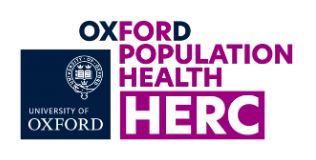
During April The Health Economics Research Centre (HERC) at the University of Oxford delivered a newly designed online short course for D.Phil. students and postdoctoral researchers.
The focus was best practices when integrating economic evaluation into clinical trials and was designed to give participants an understanding of what is required to enable an economic evaluation to be integrated into a clinical trial at the design stage.
Divided into 5 sessions (in English) the course aims to introduce key health economic concepts, answer the question of why economic evaluations are often required by Governments/others stakeholders to determine if new technologies are cost-effective and to explain how to involve health economists in each stage of clinical trials, from study design and preparing funding applications to results reporting.
HERC works in collaboration with both Oxford Biomedical Research Centres and on this occasion NIHR Oxford Health Biomedical Research Centre funded places to attend the course.
Attendee D.Phil. student Rowan Diamond said:
“This course gives a comprehensive introduction to the economic evaluation of clinical trials. It is very accessible, with much of the learning done in participants’ own time. For my career stage it represents a perfect way to start thinking about these important concepts. I have no doubt that I will use these in my applications for future funding and to ensure that I consider the health economic evaluation aspect of my work as early as possible in the lifecycle of a research study. Finally, the course has helped me to retrospectively understand why research was done in certain ways and to make sense of data I had been collecting in the past for other studies – now a lot of past and current practice makes more sense to me.”
For my career stage it represents a perfect way to start thinking about these important concepts. I have no doubt that I will use these in my applications for future funding and to ensure that I consider the health economic evaluation aspect of my work as early as possible in the lifecycle of a research study. Finally, the course has helped me to retrospectively understand why research was done in certain ways and to make sense of data I had been collecting in the past for other studies – now a lot of past and current practice makes more sense to me.”
Departmental Clinical Post-doctoral researcher Angharad De Cates said:
“It was a wide-ranging course running from the basics of how to define economic evaluations, through to how to design studies so that cost-effectiveness could be appropriately calculated for your study population. The format of listening to lectures in our own time beforehand was inclusive, as it allowed individuals to pick their best time and work at their own pace. The course included exercises which allowed us to check our understanding of the lectures and it was useful to then be able to hear the best possible answers from tutors.”
 D.Phil. student Eoin Kelleher said:
D.Phil. student Eoin Kelleher said:
“As a DPhil student, I found the Integrating Economic Evaluation into Clinical Trials course to be an excellent resource for understanding the process. My project involves a feasibility study, and we plan on including an economic evaluation in this. The course was informative on what data to collect on both outcomes and resources to use. The course also provided practical examples of how to collect data effectively. The pre-recorded lectures were of high quality, providing clear explanations of the topic, and did not assume too much prior knowledge of health economics. The duration of the pre-recorded lectures, split into short sections, was appropriate. The accompanying slides and glossary will be valuable resources for future reference. The exercise was useful and helped me apply the concepts covered in the lectures.The two short interactive Q&A sessions were helpful in clarifying any questions I had and addressing some of the practical issues of collecting healthcare use data.I highly recommend this course to anyone interested in learning how to integrate economic evaluation into their clinical trial. It provides practical advice on how to collaborate with a health economist and what is required at the design stage.”
We would like to thank Rowan, Angharad and Eoin for the valuable evaluation of the course and look forward to working with HERC in future training and development efforts.

